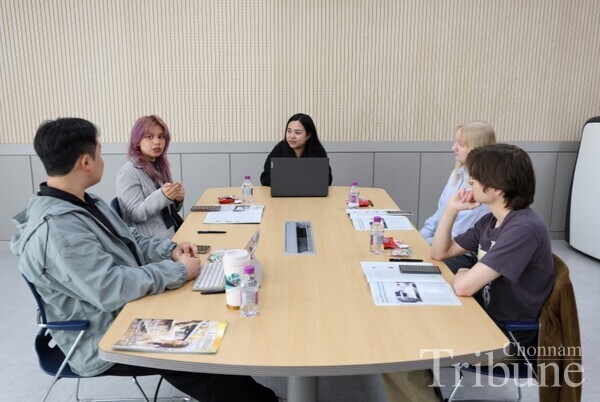
Dutch social psychologist Geert Hofstede introduced the concept of “Power Distance” as part of his cultural dimensions theory. Power distance is the extent to which the less powerful members of organizations and institutions accept and expect that power is distributed unequally. This dynamic can be turned into an index which explains how members in a society relate to one another on a hierarchical scale from zero to 100. Degrees of power distance vary widely around the world, ranging from societies that embrace authority and obedience to those where equal treatment for everyone is valued above nearly all else. The way societies structure relationships between authority figures and subordinates significantly influences communication styles, leadership approaches, and social relationships, ultimately shaping the general cultural landscape. To better understand how this is experienced across cultures, the Chonnam Tribune held a roundtable discussion with a multinational group of students on power distance in their respective countries.
How is power distance perceived in your country, particularly from young people’s point of view?
Veera Voutilainen (Finland): In my country, everyone is seen as equal. In schools, students call teachers by their first names. We do not see immense differences between people, possibly because of the relatively small income gap. Our tax system supports income equality, which reduces the sense of hierarchy. There is a strong sense of mutual respect regardless of age or position, and politeness plays a more crucial role in our society.
Kim Hyeon-seong (South Korea): In South Korea, power distance is very high. People tend to show substantial deference to authority, especially in schools and workplaces. There is even an old saying: “You must not step on your teacher’s shadow.” However, young Koreans are beginning to advocate for fairness, though some spaces still maintain conventional hierarchies. For example, rarely does anyone talk back in classrooms or express opposition, even if they want to.
Janik Holländer (Germany): Germany had high power distance historically, especially through past experiences such as the military demanding authority. Today, our society promotes more equality, and we see ourselves as equals. Although inequality and power displays are inevitable, we acknowledge that everyone is in the same field, just with different roles.
What experiences or challenges have you faced due to power distance?
Pauline Mae Dela Cruz (The Philippines): For Filipinos, power distance is deeply expressed within the family. Older people expect obedience without question, and young people struggle to have their voices heard. I get frustrated when my opinions are dismissed due to my young age. Many people take advantage of their power and abuse it, disregarding morals and humanity.
Janik Holländer: As a young person, I have limited experience with power distance. However, based on my general observations, people feel uncomfortable when they find themselves in the lower position of the power pyramid. I wonder if I will still hold the same beliefs about power if I ever have authority one day. The topic is worth staying mindful of, recognizing that it is possible to be respectful of different societal roles without asserting superiority.
Do you think power distance is changing toward a more ideal power structure?
Veera Voutilainen: I have not witnessed much change in Finland because power distance has already been low. I am comfortable talking to my parents about things that bother me while respecting them. For me, the important part is remembering this mindset when we grow older, so we do not repeat the mistakes of people who mistreated others when they were in power.
Pauline Mae Dela Cruz: In the Philippines, I feel power distance is gradually shifting. People my age are beginning to stand up against traditional authority, especially among family members. Fundamental changes must come from those in power. When they are more open-minded and respectful, things will improve.
Kim Hyeon-seong: I reckon power distance is plummeting in South Korea. It is not a matter of eliminating power and authority entirely because society would be in chaos without it. Although hierarchy is still apparent in schools and companies, our generation is trying to speak out more and receiving positive support. Specifically, in the military, anonymous feedback systems have been introduced to give those in lower positions a safer way to raise their concerns. I hope more people will be treasured for their skills and contributions, not just their backgrounds.
There is no doubt that power distance is deeply rooted in tradition. Nevertheless, as globalization and generational shifts continue to reshape society, young people are actively challenging old norms. In many countries with high power distance, younger generations are increasingly challenging these norms in pursuit of more equitable and open communication. Meanwhile, low power distance countries strive to maintain egalitarian values, where mutual respect and individual voices are prioritized regardless of status. Despite cultural differences, there is a shared focus on respectful and inclusive authority. Although hierarchy and power will always exist, conformity to unjust authorities should be redefined to better support human dignity and social harmony.
Pauline Mae Dela Cruz, Exchange Student, Dept. of Fine Arts, Philippines
Janik Holländer, Exchange Student, Dept. of Political Science and International Relations, Germany
Veera Voutilainen, Senior, Dept. of Fine Arts, Finland
Kim Hyeon-seong, Senior, Faculty of Business Administration, South Korea
By Antiquando Daniela, Reporter

